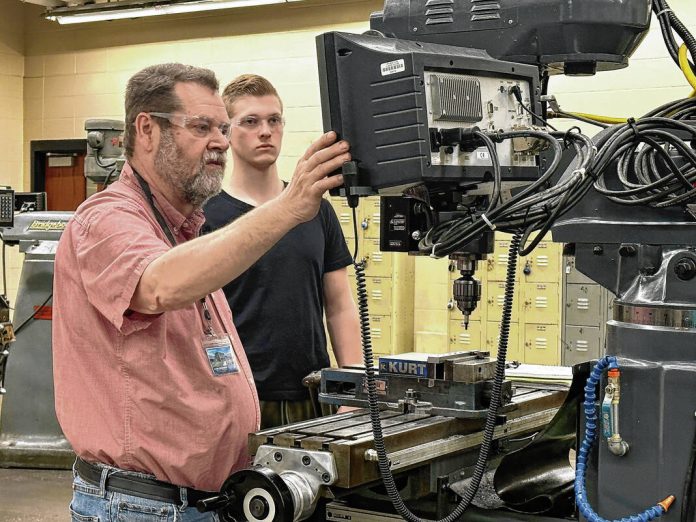For one Central Nine Career Center teacher, life is not a game of inches, but an increment 10,000 times more precise than that.
Those measurements were part of precision machining technology, a class Darryl Willoughby taught at Central Nine for 32 years before retiring at the end of the spring semester.
“We learn to set up and operate a lot of precision metal cutting equipment like lathes, mills and grinders,” Willoughby said. “We break down an inch a thousand times and divide that 10 more times. It’s like splitting a hair 60 times. We’re making parts for things that are precise. For things like jet engines, racing parts for high-performance motors, for defense work with turbo electric motors and generators, it’s very precise. You can’t miss what you want by very much.”
Willoughby worked in the machining industry for 12 years before taking his knowledge to the classroom.
“I was a machinist at Major Tool and Machine,” he said. “We did aerospace work, defense work, nuclear work, a lot of high-end machining and large parts. I have students that intern and work there now, students who have been there years and some just started through my internship last year.”
Willoughby got his desire to teach from coaching youth baseball and football. Central Nine presented an opportunity to teach without leaving his field of expertise. His students could take classes on-site at Central Nine their junior year before moving onto an industry internship their senior year, he said.
“Since they’re seniors at that point, that can turn into offers of full-time employment after graduation, and they can get reimbursed for taking college courses while they work at the shop,” Willoughby said. “Several of my kids have gone on to become engineers, tool makers, (computer numeric control) programmers, quality control inspectors. There are a lot of different avenues.”
During his more than three-decade career, the biggest change was technology, which made machining much more efficient, he said.
“When I started, everything was done manually on machines controlled by your physical motions,” he said. “By now, everything is computerized. You’re programming a computer which will drive servo motors to cut metal in shapes, it’s programming through computer numeric control machines.”
Reinforcing concepts is the best way for students to grasp the material, Willoughby said.
“I always say ‘it’s not enough to teach them, you gotta trick them into learning,’” he said. “I present the material verbally and then I give them a demonstration and we go to the lab and do it. My class is generally 20% classroom and 80% lab time.”
Throughout his career, Willoughby taught about 1,300 students, Central Nine spokesperson Tiffany Bickerstaff said in an email.
For Willoughby, the greatest satisfaction came from seeing his students be successful in life after graduation. He’s had students start companies and go on to hire other students of his, he said.
“I hope they gain a good work ethic, understand the importance of quality work and take pride in their work,” Willoughby said. “Any time you see a kid come back to you and show you how successful they’ve been in precision machining, that’s the satisfaction.”





